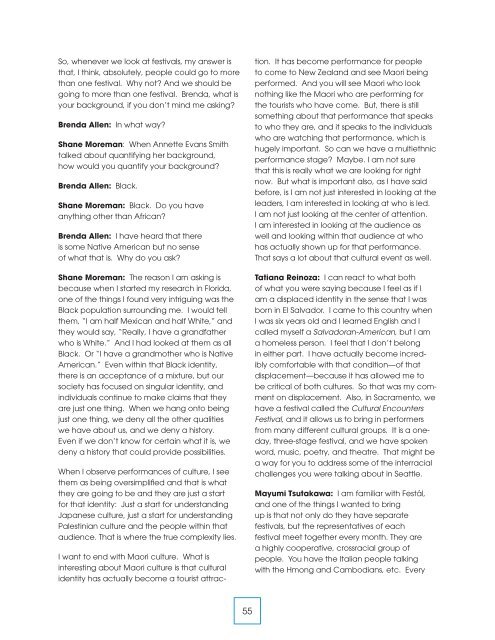The New Face of Arts Leadership in the West - westaf - The Western ...
The New Face of Arts Leadership in the West - westaf - The Western ...
The New Face of Arts Leadership in the West - westaf - The Western ...
You also want an ePaper? Increase the reach of your titles
YUMPU automatically turns print PDFs into web optimized ePapers that Google loves.
So, whenever we look at festivals, my answer is<br />
that, I th<strong>in</strong>k, absolutely, people could go to more<br />
than one festival. Why not? And we should be<br />
go<strong>in</strong>g to more than one festival. Brenda, what is<br />
your background, if you don’t m<strong>in</strong>d me ask<strong>in</strong>g?<br />
Brenda Allen: In what way?<br />
Shane Moreman: When Annette Evans Smith<br />
talked about quantify<strong>in</strong>g her background,<br />
how would you quantify your background?<br />
Brenda Allen: Black.<br />
Shane Moreman: Black. Do you have<br />
anyth<strong>in</strong>g o<strong>the</strong>r than African?<br />
Brenda Allen: I have heard that <strong>the</strong>re<br />
is some Native American but no sense<br />
<strong>of</strong> what that is. Why do you ask?<br />
Shane Moreman: <strong>The</strong> reason I am ask<strong>in</strong>g is<br />
because when I started my research <strong>in</strong> Florida,<br />
one <strong>of</strong> <strong>the</strong> th<strong>in</strong>gs I found very <strong>in</strong>trigu<strong>in</strong>g was <strong>the</strong><br />
Black population surround<strong>in</strong>g me. I would tell<br />
<strong>the</strong>m, “I am half Mexican and half White,” and<br />
<strong>the</strong>y would say, “Really, I have a grandfa<strong>the</strong>r<br />
who is White.” And I had looked at <strong>the</strong>m as all<br />
Black. Or “I have a grandmo<strong>the</strong>r who is Native<br />
American.” Even with<strong>in</strong> that Black identity,<br />
<strong>the</strong>re is an acceptance <strong>of</strong> a mixture, but our<br />
society has focused on s<strong>in</strong>gular identity, and<br />
<strong>in</strong>dividuals cont<strong>in</strong>ue to make claims that <strong>the</strong>y<br />
are just one th<strong>in</strong>g. When we hang onto be<strong>in</strong>g<br />
just one th<strong>in</strong>g, we deny all <strong>the</strong> o<strong>the</strong>r qualities<br />
we have about us, and we deny a history.<br />
Even if we don’t know for certa<strong>in</strong> what it is, we<br />
deny a history that could provide possibilities.<br />
When I observe performances <strong>of</strong> culture, I see<br />
<strong>the</strong>m as be<strong>in</strong>g oversimplified and that is what<br />
<strong>the</strong>y are go<strong>in</strong>g to be and <strong>the</strong>y are just a start<br />
for that identity: Just a start for understand<strong>in</strong>g<br />
Japanese culture, just a start for understand<strong>in</strong>g<br />
Palest<strong>in</strong>ian culture and <strong>the</strong> people with<strong>in</strong> that<br />
audience. That is where <strong>the</strong> true complexity lies.<br />
I want to end with Maori culture. What is<br />
<strong>in</strong>terest<strong>in</strong>g about Maori culture is that cultural<br />
identity has actually become a tourist attraction.<br />
It has become performance for people<br />
to come to <strong>New</strong> Zealand and see Maori be<strong>in</strong>g<br />
performed. And you will see Maori who look<br />
noth<strong>in</strong>g like <strong>the</strong> Maori who are perform<strong>in</strong>g for<br />
<strong>the</strong> tourists who have come. But, <strong>the</strong>re is still<br />
someth<strong>in</strong>g about that performance that speaks<br />
to who <strong>the</strong>y are, and it speaks to <strong>the</strong> <strong>in</strong>dividuals<br />
who are watch<strong>in</strong>g that performance, which is<br />
hugely important. So can we have a multiethnic<br />
performance stage? Maybe. I am not sure<br />
that this is really what we are look<strong>in</strong>g for right<br />
now. But what is important also, as I have said<br />
before, is I am not just <strong>in</strong>terested <strong>in</strong> look<strong>in</strong>g at <strong>the</strong><br />
leaders, I am <strong>in</strong>terested <strong>in</strong> look<strong>in</strong>g at who is led.<br />
I am not just look<strong>in</strong>g at <strong>the</strong> center <strong>of</strong> attention.<br />
I am <strong>in</strong>terested <strong>in</strong> look<strong>in</strong>g at <strong>the</strong> audience as<br />
well and look<strong>in</strong>g with<strong>in</strong> that audience at who<br />
has actually shown up for that performance.<br />
That says a lot about that cultural event as well.<br />
Tatiana Re<strong>in</strong>oza: I can react to what both<br />
<strong>of</strong> what you were say<strong>in</strong>g because I feel as if I<br />
am a displaced identity <strong>in</strong> <strong>the</strong> sense that I was<br />
born <strong>in</strong> El Salvador. I came to this country when<br />
I was six years old and I learned English and I<br />
called myself a Salvadoran-American, but I am<br />
a homeless person. I feel that I don’t belong<br />
<strong>in</strong> ei<strong>the</strong>r part. I have actually become <strong>in</strong>credibly<br />
comfortable with that condition—<strong>of</strong> that<br />
displacement—because it has allowed me to<br />
be critical <strong>of</strong> both cultures. So that was my comment<br />
on displacement. Also, <strong>in</strong> Sacramento, we<br />
have a festival called <strong>the</strong> Cultural Encounters<br />
Festival, and it allows us to br<strong>in</strong>g <strong>in</strong> performers<br />
from many different cultural groups. It is a oneday,<br />
three-stage festival, and we have spoken<br />
word, music, poetry, and <strong>the</strong>atre. That might be<br />
a way for you to address some <strong>of</strong> <strong>the</strong> <strong>in</strong>terracial<br />
challenges you were talk<strong>in</strong>g about <strong>in</strong> Seattle.<br />
Mayumi Tsutakawa: I am familiar with Festál,<br />
and one <strong>of</strong> <strong>the</strong> th<strong>in</strong>gs I wanted to br<strong>in</strong>g<br />
up is that not only do <strong>the</strong>y have separate<br />
festivals, but <strong>the</strong> representatives <strong>of</strong> each<br />
festival meet toge<strong>the</strong>r every month. <strong>The</strong>y are<br />
a highly cooperative, crossracial group <strong>of</strong><br />
people. You have <strong>the</strong> Italian people talk<strong>in</strong>g<br />
with <strong>the</strong> Hmong and Cambodians, etc. Every<br />
55


